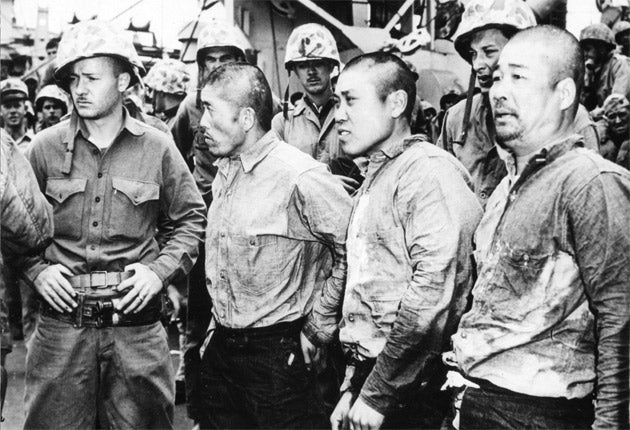Japan promises to bring home soldiers who died at Iwo Jima

Your support helps us to tell the story
From reproductive rights to climate change to Big Tech, The Independent is on the ground when the story is developing. Whether it's investigating the financials of Elon Musk's pro-Trump PAC or producing our latest documentary, 'The A Word', which shines a light on the American women fighting for reproductive rights, we know how important it is to parse out the facts from the messaging.
At such a critical moment in US history, we need reporters on the ground. Your donation allows us to keep sending journalists to speak to both sides of the story.
The Independent is trusted by Americans across the entire political spectrum. And unlike many other quality news outlets, we choose not to lock Americans out of our reporting and analysis with paywalls. We believe quality journalism should be available to everyone, paid for by those who can afford it.
Your support makes all the difference.The Japanese Prime Minister, Naoto Kan, has vowed to bring closure to one of the Second World War's most notorious and iconic episodes, promising to bring home the remains of the 12,000 soldiers still missing after the battle of Iwo Jima.
The eight-square-mile island about 700 miles (1120km) south of Tokyo was blasted almost flat, becoming what one veteran called a "sulphurous, crater-filled hellhole" in six weeks of bloody fighting in February and March 1945. When the fighting stopped, nearly 7,000 mostly US soldiers were dead and just 200 of the 21,800 Japanese troops defending the island – many dug into foxholes and caves – had been taken alive.
The director Clint Eastwood's acclaimed 2006 films, Flags of Our Fathers and Letters from Iwo Jima, brought the battle for a strategic speck of volcanic rock in the Pacific Ocean juddering back into Japan's public consciousness.
"There remain many fallen soldiers," Mr Kan said at a Tokyo memorial service to inter over 800 remains from the island. "We vow to find them as soon as possible. It is the government's responsibility to search thoroughly for the remains." The speech follows his trip last December to Iwo Jima – now known as Iwo To – when he pledged to "examine every grain of sand" for men still missing in action.
The black sands of Iwo Jima passed into military legend, immortalised in a famous photograph by Joe Rosenthal showing a group of exhausted Marines raising the Stars and Stripes on Mount Suribachi on 23 February, 1945.
Even after 60 years of blood-soaked history in Korea, Vietnam, Afghanistan and Iraq, the battle remains the US Marines' deadliest: nearly one-third of all Marines killed in World War Two died on the island. It still holds the record for the number of US medals of honour awarded in a single campaign, and 218 Americans are still listed as missing in action on Iwo Jima.
But in Japan, which lost the war five months later, the remote island and the story of what happened there largely faded from view. Mr Kan was only the second Japanese leader to visit after Junichiro Koizumi, who went in 2005. Mr Koizumi's trip was seen as evidence that Japan was slowly overcoming its war amnesia, prodded along by a new generation of nationalist politicians keen to highlight Japanese heroism – and play down war crimes.
Eastwood's double-header, which explored the battle from both sides, sparked a revival of interest and the setting up of a project by the prime minister to recover the Japanese dead.
Last year, the project received a shot in the arm with the discovery of two mass graves, including one at the foot of Mount Suribachi. The find of about 2,000 remains was among the biggest since sporadic digging began in the 1950s.
Until recently, open admiration for the war dead was mainly the preserve of the political right in Japan. The very public commitment of Mr Kan, leader of the left-leaning Democratic Party, is a sign that the political consensus on the war is shifting. He gave his speech at the Chidorigafuchi National Cemetery, a secular memorial for unidentified war dead, rather than the more emotive and controversial Yasukuni Shrine, where some convicted war criminals are buried.
Mr Kan said that the search for the dead on Iwo Jima was part of the fight to preserve memories of the war. "We will continue conveying to younger generations this tragic history, which should not fade into oblivion," he said.
Join our commenting forum
Join thought-provoking conversations, follow other Independent readers and see their replies
Comments